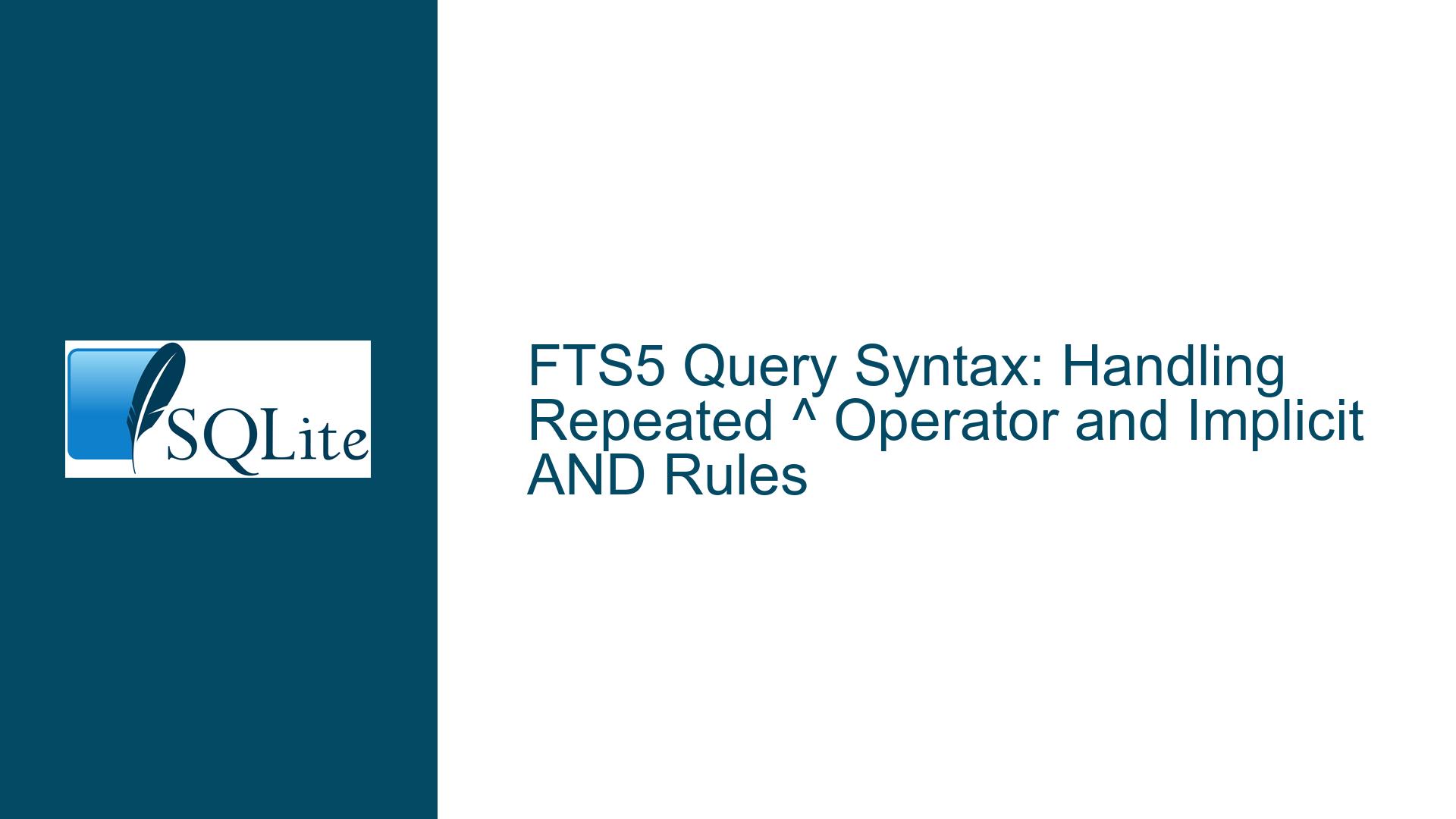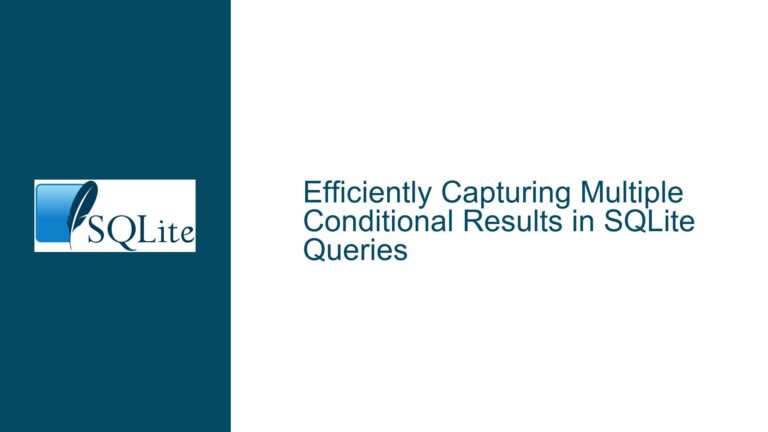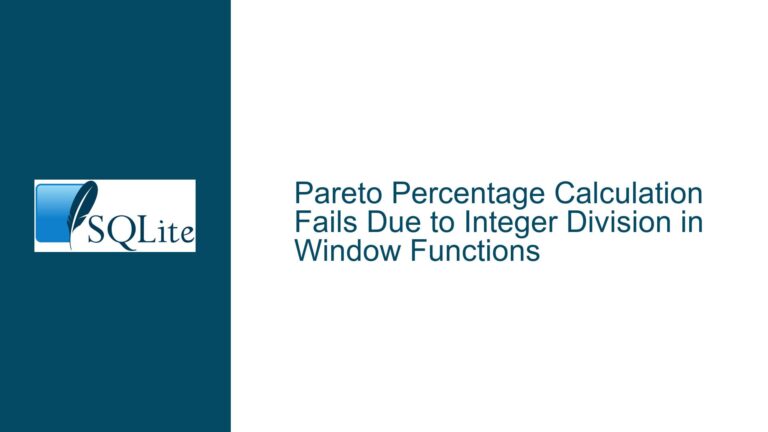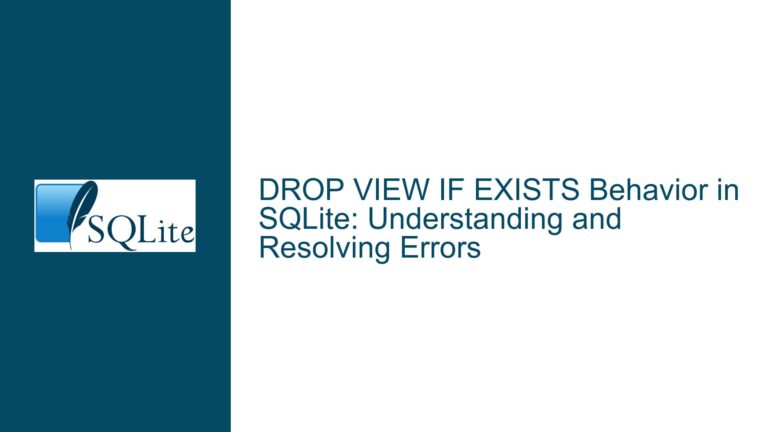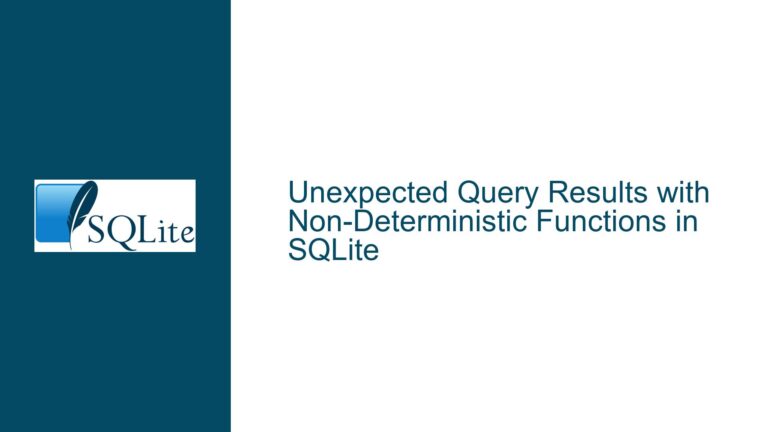FTS5 Query Syntax: Handling Repeated ^ Operator and Implicit AND Rules
Issue Overview: Repeated ^ Operator and Implicit AND in FTS5 Queries
The core issue revolves around the behavior of the ^ operator in SQLite’s FTS5 (Full-Text Search) query syntax, specifically when it is repeated in a query. According to the FTS5 grammar documentation, the ^ operator is intended to be used only before the first phrase in a query, indicating that the phrase must appear at the start of the document. However, the current implementation allows for multiple ^ operators to be used in sequence, such as ^one ^two, without raising a syntax error. This behavior appears to contradict the documented grammar rules, which suggest that such usage should be invalid.
Additionally, the discussion touches on the handling of implicit AND operators in FTS5 queries. The FTS5 documentation states that implicit AND operators are never inserted after or before an expression enclosed in parentheses. This rule can lead to confusion when programmatically generating queries, as it requires explicit AND operators to be inserted between parenthesized expressions. The absence of implicit AND operators in these cases can result in syntax errors, making it more challenging to construct queries dynamically.
The issue is further complicated by the fact that the FTS5 grammar does not explicitly allow for the repetition of the ^ operator, nor does it provide clear rules for the insertion of implicit AND operators in all contexts. This ambiguity can lead to inconsistencies in query parsing and execution, particularly when dealing with complex queries that involve multiple phrases and operators.
Possible Causes: Grammar Ambiguity and Implementation Details
The root cause of the issue lies in the ambiguity of the FTS5 grammar and the way it is implemented in SQLite. The grammar, as documented, does not explicitly allow for the repetition of the ^ operator, yet the implementation appears to accept such queries without error. This discrepancy suggests that the grammar rules may not be fully enforced by the FTS5 parser, or that the parser has been designed to handle certain cases more leniently than the documentation implies.
One possible explanation for this behavior is that the FTS5 parser treats the ^ operator as a modifier that can be applied to individual phrases, rather than as a global constraint that applies only to the first phrase in the query. This interpretation would allow for multiple ^ operators to be used in sequence, even though the grammar does not explicitly permit it. However, this interpretation is not consistent with the documented grammar, which suggests that the ^ operator should only be used before the first phrase.
Another possible cause is the handling of implicit AND operators in FTS5 queries. The documentation states that implicit AND operators are never inserted after or before an expression enclosed in parentheses. This rule is likely intended to prevent ambiguity in query parsing, but it can lead to unexpected behavior when constructing queries programmatically. For example, a query like (one) (two) would be considered invalid because the implicit AND operator is not inserted between the parenthesized expressions. This behavior can be problematic when generating queries dynamically, as it requires explicit AND operators to be inserted in all cases where parenthesized expressions are used.
The implementation of the FTS5 parser may also play a role in these issues. The parser may be designed to handle certain cases more leniently than the grammar suggests, allowing for queries that do not strictly adhere to the documented rules. This leniency could be intentional, to provide more flexibility in query construction, or it could be an oversight in the implementation. Regardless of the reason, the result is that the behavior of the FTS5 parser does not always align with the documented grammar, leading to confusion and potential inconsistencies in query execution.
Troubleshooting Steps, Solutions & Fixes: Addressing Grammar Ambiguity and Implementation Inconsistencies
To address the issues surrounding the repeated ^ operator and the handling of implicit AND operators in FTS5 queries, several steps can be taken to clarify the grammar and ensure consistent behavior in the implementation.
1. Clarify the Grammar Rules for the ^ Operator:
The first step is to clarify the grammar rules for the ^ operator in the FTS5 documentation. The documentation should explicitly state whether the ^ operator can be used multiple times in a query, and if so, under what conditions. If the intention is to allow multiple ^ operators, the grammar should be updated to reflect this. If the intention is to restrict the ^ operator to the first phrase only, the documentation should clearly state this, and the implementation should be updated to enforce this rule.
2. Update the FTS5 Parser to Enforce Grammar Rules:
Once the grammar rules have been clarified, the FTS5 parser should be updated to enforce these rules consistently. If the ^ operator is intended to be used only before the first phrase, the parser should raise a syntax error when it encounters multiple ^ operators in a query. This would ensure that the behavior of the parser aligns with the documented grammar, reducing confusion and potential inconsistencies in query execution.
3. Revisit the Handling of Implicit AND Operators:
The handling of implicit AND operators in FTS5 queries should also be revisited. The current rule, which states that implicit AND operators are never inserted after or before an expression enclosed in parentheses, can lead to unexpected behavior when constructing queries programmatically. To address this, the grammar could be updated to allow for implicit AND operators in all contexts, including between parenthesized expressions. This would make it easier to construct queries dynamically, as it would eliminate the need to explicitly insert AND operators in all cases.
4. Provide Clear Examples and Guidelines:
In addition to updating the grammar and the parser, the FTS5 documentation should provide clear examples and guidelines for constructing queries that involve the ^ operator and implicit AND operators. These examples should demonstrate the correct usage of these operators and highlight common pitfalls to avoid. By providing clear guidance, the documentation can help users construct queries that adhere to the grammar rules and produce the expected results.
5. Consider Adding Support for Token-Based Queries:
Finally, the discussion touches on the desire for a way to provide tokens directly to the FTS5 engine, rather than relying on pre-tokenized text. This feature would be particularly useful when expanding search results or performing "more like this" searches. By allowing users to provide tokens directly, the FTS5 engine could offer more flexibility in query construction and improve the accuracy of search results. This feature could be implemented as an extension to the existing FTS5 API, allowing users to specify tokens in addition to or instead of text.
6. Test and Validate Changes:
Any changes to the FTS5 grammar or parser should be thoroughly tested and validated to ensure that they do not introduce new issues or break existing functionality. This testing should include a variety of query types, including those that involve the ^ operator, implicit AND operators, and parenthesized expressions. By rigorously testing the changes, the SQLite development team can ensure that the FTS5 engine continues to function as expected and that the updated grammar rules are consistently enforced.
7. Engage with the Community:
Finally, the SQLite development team should engage with the community to gather feedback on the proposed changes and to identify any additional issues or concerns. By involving the community in the development process, the team can ensure that the changes meet the needs of users and address the most pressing issues. This engagement could take the form of forum discussions, surveys, or beta testing programs, allowing users to provide input and report any issues they encounter.
In conclusion, the issues surrounding the repeated ^ operator and the handling of implicit AND operators in FTS5 queries stem from ambiguity in the grammar and inconsistencies in the implementation. By clarifying the grammar rules, updating the parser, and providing clear guidance, the SQLite development team can address these issues and ensure that the FTS5 engine functions as expected. Additionally, by considering new features such as token-based queries and engaging with the community, the team can further enhance the flexibility and usability of the FTS5 engine.
